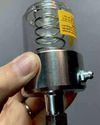
Lubricants essential and expensive of components machine systems and are need sampling, analysis and monitoring.
Monitoring can be either performance testing or oil condition monitoring. Knowledge of the system's critical failure modes is essential for cost-effective oil and machinery monitoring. The determination of insoluble contaminants in lube oil is one of the parameters usually recommended for evaluating the condition of in-service lube oil. The present study provides a comparative evaluation of two different tests that measure insoluble contaminants in lube oil. The objective of this study is to compare existing tests and adopt the most effective test to be used for the measurement of insoluble contaminants in lube oil. The first test utilizes the gravimetric method through a filter (filter test) to measure the weight of insoluble contaminants, while the second test utilizes centrifugal forces at high speeds (ultra-centrifuge) for measurement. A total of 305 different lube oil samples were used in this study for both tests, where the results are critically analyzed and compared against each other. In addition, the tests are evaluated in terms of efficiency as well as safety.
Introduction
Lubrication oil is an important information source for early machine failure detection, just like the role of human blood sample testing in performing disease detection. The condition of lubrication oil and its circulation system reflect the health status of the machinery and its components. Contamination in lube oil is the major cause of rotating equipment failures in industry. The impact of this contamination is exponential on equipment reliability over time.
This story is from the January - February 2023 edition of MACHINERY LUBRICATION INDIA.
Start your 7-day Magzter GOLD free trial to access thousands of curated premium stories, and 9,000+ magazines and newspapers.
Already a subscriber ? Sign In
This story is from the January - February 2023 edition of MACHINERY LUBRICATION INDIA.
Start your 7-day Magzter GOLD free trial to access thousands of curated premium stories, and 9,000+ magazines and newspapers.
Already a subscriber? Sign In

The Secrets For Implementing A Clean lubricant Program
If you could find an investment that guaranteed a return 40 times greater than your initial investment, you probably wouldn't pass it up.

MAINTAIN? REPAIR? REPLACE?
When considering the life of any asset, the question arises: what types of interventions should be planned to keep it operating or to restore operation in the event of its failure?

Engineering Reports Should Be Like Bad Movies
I'm frequently asked to review engineering reports, and I'm continually baffled by how many engineers want to take their readers on a journey instead of getting to the point.

WHY SCHEDULED OIL CHANGES AREN'T ENOUGH TO MITIGATE LUBRICANT CONTAMINATION
There are few problems more insidious or damaging to large industrial machinery than contaminated lubricant.

LUBRICATION CONTAMINATION PREVENTION
How many articles have you read, or seminars listened to, that tout the value of contamination control? If you are like me, they number in the hundreds—if not thousands. One thing about these articles and seminars that bothers me is the word “control”.

LUBRICANT CONTAMINATION PREVENTION AND MITIGATION: A Guide For Maintenance Professionals
Lubricants are essential for the smooth and efficient operation of many types of machinery, from engines and turbines to gears and bearings.

TASK-BASED TRAINING | INSPECTING A SINGLE-POINT LUBRICATOR
A single-point lubricator is a device engineered to attach to a single unit to regularly and automatically deliver a small amount of clean grease or lubricating oil to a specific area.

TOP LEADERSHIP FOCUSES FOR IMPROVED RELIABILITY AND COST REDUCTION
Here’s a scenario that may sound eerily familiar – you have a new reliability initiative.

4 KEY ELEMENTS FOR INTERPRETING AN OIL ANALYSIS REPORT
Years ago, a customer came into my office, visibly upset. He had just received his second oil analysis report for one of his Caterpillar gas engines.

ASTM ENHANCEMENTS TO MICROSCOPIC PARTICLE IDENTIFICATION AND DOCUMENTATION
In 1982, Daniel Anderson published his influential book, \"Wear Particle Atlas\", which describes, sizes, and classifies particles found in oil.